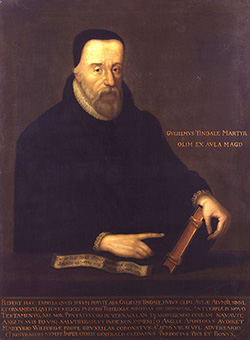
William Tyndale
William Tyndale was one of the greatest lovers of the Lord Jesus Christ that the church has ever been blessed to know. The story of his life is one of great discovery. He was the Englishman that “gave God an English voice.” He was the first man to translate the Scripture into English from the original Greek and Hebrew languages. He was the Oxford and Cambridge scholar that brought the written Word to the common folk. He was the courageous lover of Christ who was martyred for his labors to make God’s Word available in the English language. He contributed more to the English language than any single man in history.
Three distinctives mark this tremendous reformer:
1. Christian Character
Tyndale did not conduct himself in the manners of Luther, Zwingli, Calvin, and Knox. Moreover, he was not “a political creature.” John Foxe notes that “his manners and conversation being correspondent to the same, were such that all they that knew him reputed him to be a man of most virtuous disposition, and of life unspotted.” What’s most important about Tyndale is not that he was a master of the Scriptures, but rather that he was mastered by the Scriptures. The great translator was first affected by the Scriptures he translated. Later, Foxe wrote, “He had so preached to them who had him in charge, and such as was there conversant with him in the Castle that they reported of him, that if he were not a good Christian man, they knew not whom they might take to be one.”
Tyndale also preached what he practiced. In his book entitled, The Parable of the Wicked Mammon, Tyndale wrote: “The life of a Christian man is inward between him and God, and properly is the consent of the spirit to the will of God and to the honour of God. And God’s honour is the final end of all good works.” He had a warming focus on love and would say things like, “delight in God” and “let love interpret.”
2. Christian Scholarship
Tyndale was a world-class scholar, studying and teaching at Oxford and Cambridge. God had richly blessed Tyndale with special abilities, and particularly in the learning and command of languages. He could verbally speak eight languages fluently, including English, Latin, French, Spanish, German, Italian, Greek, and Hebrew.
It is said that Tyndale gave God an English voice through his pioneering translation work. But more than mere translation is meant by this statement. He not only put Greek words into English form, he crafted a new standard of the English language. Some have plainly stated that without Tyndale we would have no Shakespeare. Following the advent of Tyndale’s New Testament (1570-1630), more than 30,000 new words entered the English language—this is more than any other time in history. “It was the vernacular Scripture that unleashed the English voice.”
Tyndale gave us words like: Jehovah, thanksgiving, passover, intercession, holy place, atonement, mercy seat, judgement seat, chasten, impure, longed, apostleship, brotherly, sorcerer, whoremonger, viper, and godless.
Tyndale was burdened for the spread of God’s word among his countrymen. He gave us our English Bible. The Puritan divines “assembled by King James to prepare the Authorized Version of 1611, so often praised for unlikely corporate inspiration, took over Tyndale’s work. Nine-tenths of the Authorized Version’s New Testament is Tyndale’s. The same is true of the first half of the Old Testament, which is as far as he was able to get before he was executed outside of Brussels in 1536.”
3. Christian Martyrdom
Tyndale was faithful to the very end and was the only Magisterial Reformer who was martyred for his faith. John Foxe tells us of his terrible end:
“At last, after much reasoning, when no reason would serve, although he deserved no death, he was condemned by virtue of the emperor's decree, made in the assembly at Augsburg. Brought forth to the place of execution, he was tied to the stake, strangled by the hangman, and afterwards consumed with fire, at the town of Vilvorde, A.D. 1536; crying at the stake with a fervent zeal, and a loud voice, 'Lord! open the king of England's eyes.'”
He was a great scholar and a true reformer of Christ’s church. But most notably of all, he was a deep lover of Christ. Tyndale once wrote:
The grace of our Saviour Jesus Christ, his patience, meekness, humbleness, circumspection, and wisdom, be with your heart. Amen. Dearly beloved brother Jacob, mine heart’s desire in our Saviour Jesus is, that you arm yourself with patience, and be cold, sober, wise, and circumspect: and that you keep a-low by the ground, avoiding high questions that pass the common capacity. But expound the law truly . . . and then, as a faithful minister, set abroach the mercy of our Lord Jesus, and let the wounded consciences drink of the water of him. And then shall your preaching be with power, and not as the doctrine of the hypocrites; and the spirit of God shall work with you, and all consciences shall bear record unto you, and feel that it is so.
You cannot rightly appreciate the history of the English-speaking world in these past 500 years without one, William Tyndale. To know the facts about William Tyndale is not enough. Instead, strive to know the heart, the cause, the burden, the passion, the pain, and most importantly, the God of William Tyndale.
Tyndale’s major contributions include:
- Biblical exegesis and expository preaching
- A high view of Holy Scripture
- A high view of God as specifically sovereign
- A high view of and a vastly accentuated dependence on the Holy Spirit
- Centrality of Christ in the church
- Emphasis on the Gospel in all ministry
- Pastoral ministry and compassionate care for God’s people
- Memorial view of the Lord’s Supper
- Eradication of religious superstition

